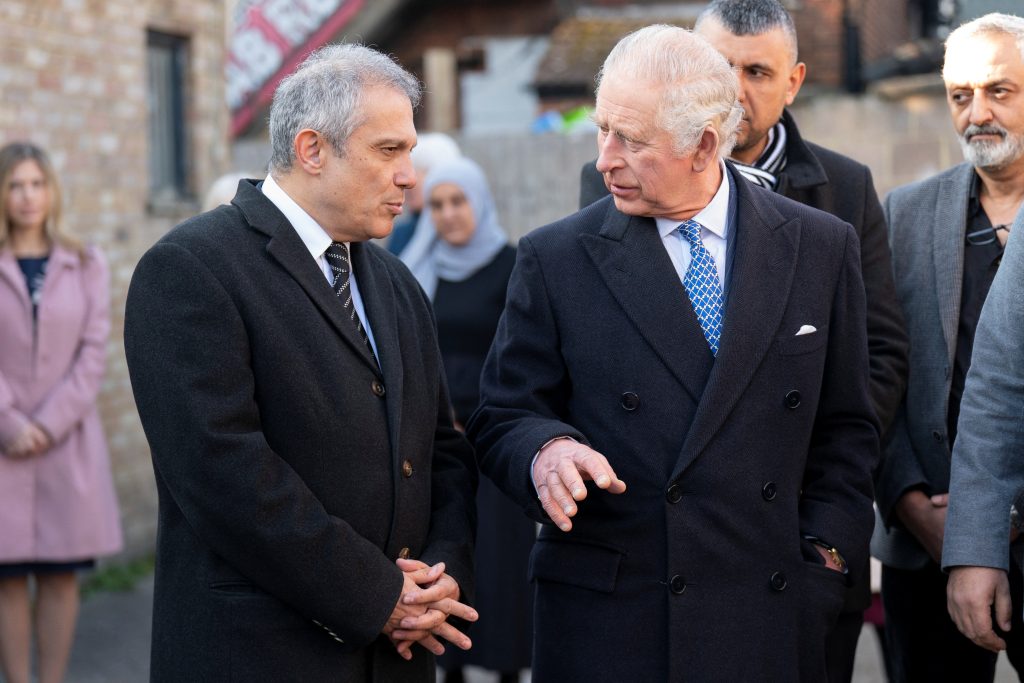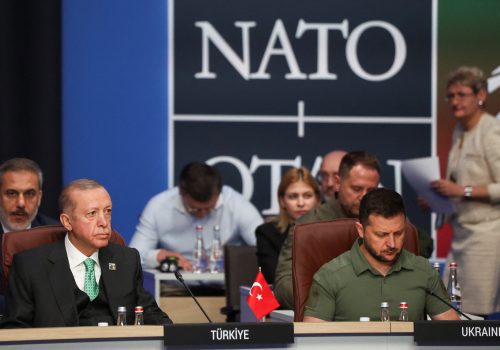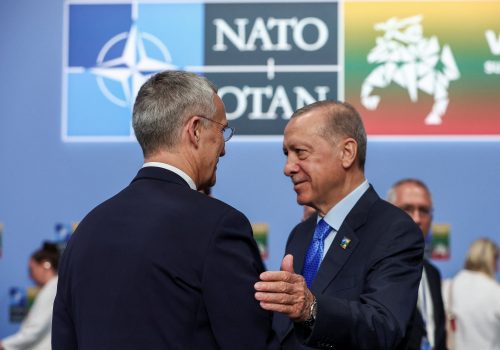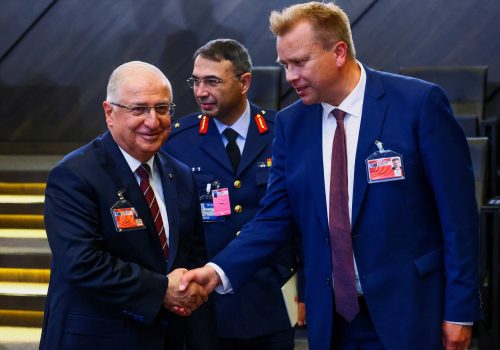The United Kingdom’s withdrawal from the European Union (EU) has transformed how the country interacts with the rest of the world. In many ways, it has served as a catalyst to deepen bilateral relations with Turkey—particularly around trade and economic cooperation with Ankara.
As the United Kingdom seeks new opportunities to diversify its trade relations post-Brexit, it has recognized Turkey as a market of interest and as an integral partner. Most recently, following Turkish President Recep Tayyip Erdoğan’s reelection in May, UK Prime Minister Rishi Sunak took to Twitter, writing that he “[looks] forward to continuing the strong collaboration” between the United Kingdom and Turkey, “from growing trade to tackling security threats as NATO allies.”
Both countries have set about making their partnership even stronger, including by starting talks to renegotiate the existing UK-Turkey free trade agreement. But this strengthening partnership can be seen in several areas other than trade such as investment, migration policy, and defense cooperation, which builds on the strategic partnership that the UK government outlined in 2010.
Trade
As part of its strategy to diversify its trade partnerships, particularly searching outside of the EU, the United Kingdom has courted Turkey, labeling it as a target market. Turkey provides the United Kingdom with access to its own market, and it also serves as an entry point to other dynamic markets in Eastern Europe and the Middle East where the United Kingdom has additional strategic interests.
Following Brexit, Turkey and the United Kingdom set up an initial free trade agreement, which came into effect on January 1, 2021. The agreement aimed to maintain preferential trade relations (replacing the EU-Turkey customs union) as well as to enhance future bilateral trade relations. Over time, UK-Turkey trade grew, with trade totaling 23.8 billion pounds between March 2022 and March 2023—up more than 20 percent from the previous year when adjusting for price changes.
The decision announced on July 18 to renegotiate the existing agreement came after a review found several areas for improvement, notably regarding services, data, and the digital sector. Should an updated agreement that reduces trade barriers and tariffs be agreed upon, it could further deepen economic ties—and cooperation more broadly—between the United Kingdom and Turkey.
However, this effort to strengthen the UK-Turkey partnership will take time—it could take years to negotiate a new free trade agreement, and implementation will be complex. It will also require a willingness on both sides to compromise and find common ground. So far, it would appear that both the United Kingdom and Turkey are ready to engage accordingly. It is also unlikely that the free trade negotiations or the overall trajectory of bilateral relations would be impacted should there be a change in government in the United Kingdom.
Migration, security, and stability
In addition to growing trade relations, the United Kingdom and Turkey have increased their geopolitical cooperation. Both countries have collaborated on various diplomatic fronts and engaged in dialogue on issues relating to regional stability—particularly in relation to Iraq and Syria—as well as counterterrorism efforts.
The United Kingdom and Turkey have demonstrated strong bilateral cooperation on humanitarian and migration issues, most recently with rescue efforts following the earthquakes earlier this year. The refugee crisis resulting from the conflict in Syria has considerably affected both countries with higher migration numbers. Ankara and London have come together in an attempt to manage and address these issues and find ways to alleviate the risks associated with the crisis—such as domestic security concerns, strains on national resources, and social integration challenges.
Migration beyond the Syria context—specifically smuggling and illegal migration—has become a priority area for the United Kingdom since it exited the EU, prompting the passage of the 2023 Illegal Migration Act. Turkey, which hosts the largest refugee population in the world, has been a strategic partner in managing the United Kingdom’s migration-related concerns. The UK government recently struck a deal with Turkey to disrupt people-smuggling gangs and tackle illegal migration. The willingness of the countries to sign an agreement that tackles a problem both countries are committed to confronting is a sign of their strengthening relationship. According to the UK government, the partnership will involve a “centre of excellence” in Turkey that will, among other things, increase intelligence-sharing between enforcement agencies. This builds on an existing partnership, which last year saw the UK Home Office provide over three million pounds in funding to Turkish border forces to help block a common route for migrants to reach the United Kingdom.
Investment and defense
The United Kingdom, as it seeks to diversify its project and partner portfolios post-Brexit, is taking on new investment ventures. Earlier in July, the UK government announced it would back a 680-million-pound loan guarantee for a new high-speed electric railway in Turkey designed to connect a few major cities via a lower-carbon route. The plans connect Mersin, Adana, Osmaniye, and Gaziantep; the latter three cities were significantly impacted by the earthquakes earlier this year.
Defense cooperation has also contributed to the deepening of UK-Turkey bilateral ties. The two partners have engaged in training and capacity-building efforts, joint military operations, and defense-related trade and technology exchanges; and in recent years, the UK defense industry has secured various deals with Turkish counterparts. Turkey has imported UK arms for several years (aside from a brief halt in new export licenses for arms sales to Turkey in late 2019 due to Turkish military activity in Syria; licensing resumed in 2021). Last year, the UK defense secretary met his Turkish counterpart and asserted that both countries share a long-standing defense partnership that builds on their increased cooperation.
Yet tensions have emerged when the United Kingdom and Turkey’s strategic and foreign-policy priorities diverge, for example in the case of Syria. Furthermore, Turkey’s decision to purchase the Russian-made S-400 missile defense system in 2019 raised concerns over trust in the partnership due to the potential security risks associated with compatibility issues with NATO defense systems. Competing security concerns, especially in relation to Turkey’s involvement across the Middle East and Eastern Mediterranean, have also contributed at times to complications for Ankara and London.
Nevertheless, UK-Turkey ties are growing stronger—and it is not just due to trade. The countries are working together to tackle deep-rooted issues such as illegal migration and smuggling, especially in relation to tightened immigration policies post-Brexit—and as risks continue to evolve globally, so too does defense cooperation between both countries, whose strategic and security concerns are closely aligned. If the United Kingdom and Turkey continue the same trajectory, their relations will go from strength to strength.
Ilayda Nijhar is a global risk analyst at ODI and a London Labour Councillor. Follow her on Twitter @ilaydanijhar.
The views expressed in this piece are solely those of the author.
Further reading
Thu, Aug 3, 2023
The West must back Ukraine and Turkey to counter Russia’s attempts to control the Black Sea
TURKEYSource By Yevgeniya Gaber
Russia’s efforts to gain control in the Black Sea need to be challenged. Here’s how Ukraine and Turkey can push back with the West’s help.
Fri, Jul 14, 2023
With re-election behind him, Erdogan is turning toward the West
TURKEYSource By Grady Wilson
Turkey is sending signals to its Western allies that it's ready to strategically align with them. All parties should seize this opportunity.
Sat, Jul 8, 2023
A looming US-Turkey F-16 deal is about much more than Sweden’s NATO bid
TURKEYSource By Rich Outzen, Pınar Dost
The long-awaited fighter jet deal is a puzzle piece in a broader strategic calculation about Ankara’s role in NATO’s Southeast.
Image: King Charles III is greeted by the Turkish Ambassador to the UK Umit Yalcin as he meets members of the Turkish diaspora community who have been collecting, packaging and organising the transportation of food, blankets and warm clothing for people who have recently been affected by the earthquakes in Turkey, during a visit to the West London Turkish Volunteers in Hounslow. Picture date: Tuesday February 14, 2023. Kirsty O'Connor/Pool via REUTERS



